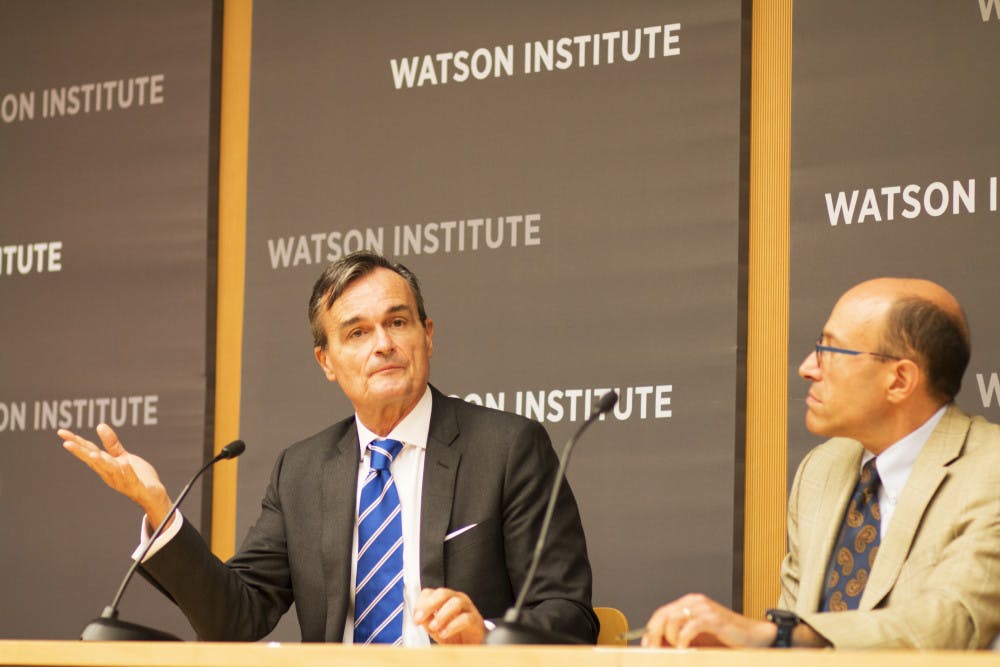Gérard Araud, ambassador of France to the United States, spoke on French secularism and the growing issue of right-wing populism in Western Europe and the United States in a lecture titled “French Foreign Policy in an Unstable World” held at the Watson Institute’s Joukowsky Forum Tuesday.
Araud prefaced his discussion about religion in France by drawing distinctions between the cultural norms of certain groups and countries. “Every country has a particular social fabric and is responding to challenges on the basis of this fabric,” Araud said. “Solutions which appear obvious in one country are impossible in another country.”
Araud went on to discuss that American secular values cannot be adopted by the French due to social and cultural differences. He noted that American secularism was contrived by the Founding Fathers to protect religion from the state. But in France, secularism served to protect the state from religion, Araud added.
“In France, we are extremely reluctant to give religion any public space. Religion is private. You never speak about religion,” he said. Araud noted that no large crosses or veils are to be worn in state schools or by civil servants working in state institutions. “They want (the public sphere) to be a neutral space,” he added.
Araud went on to further underscore France’s more potent brand of secularism, pointing out that a lot of American political rhetoric has religious themes and that just 4.5 percent of the French population attends church, compared to 25 percent of Americans.
The ambassador went on to discuss how American secularism is centered on individual freedom, while French secularism is much more collective. In discussing the issue of French municipalities imposing restrictions on the use of veils and burqas on beaches, Araud stated that the intervention arose from larger collective concerns regarding women and their freedoms.
“If you cover the body of the women, they are not equal, as it is seen that their bodies pose dangers. Men can wear normal swimming suits but women need to go to beach in veils,” he said. He attributes the laws in part to growing Islamophobia but also to France’s strong aversion to religion in the public sphere.
In response to an audience member’s question of balancing the burqa as a symbol of anti-feminist clothing and an article of personal and cultural meaning, Araud responded, “We have to find the right balance, and there is no easy answer,” he said. “Some women accept this attire, but the oppressed accept oppression. (French policies) are obstructing oppression.”
J. Nicholas Ziegler, professor of international and public affairs, directed the discussion to the issue of right-wing populism which has become “a major issue because it has thrown into question the ability of democratic political institutions to accommodate and incorporate the full range of public opinion,” he said.
“Our institutions are based on this view that we have elections, and we pay attention to public opinion. But suddenly public opinion is including strains of sentiment that are seen as problematic for other parts of our democracy, including individual rights,” Ziegler said.
Araud responded by assessing why there has been such an “expression of anger, prejudice, envy and fear” among the American middle class.
“When you look at the figures, American households have seen income falling from 2005. The basic reality is that the economy is not delivering anymore for middle-class citizens,” Araud said. “They are expressing their sufferings, and the expression of economic crisis is identity oriented. They say the immigrants and gay marriage are the problem.”
Araud noted that historical evidence shows that in the 1960s and 70s, though there were many immigrants, no one complained because there were a lot of jobs. But as the first modern economic crisis hit in 1975, the middle class blamed too many immigrants taking the jobs of native-born workers.
Araud, who specializes in the Middle East and strategic and security issues, was drawn to a career in foreign affairs during his time as a student.
“I’ve always loved history, and at the same time, I didn’t want to become a teacher. I found the best way to satisfy my love of history was to work in diplomacy. You can’t understand the world without knowing the history,” Araud said.
The ambassador emphasized the importance of understanding the distinct nuances of multiple perspectives on a given issue. “When you negotiate with diplomats of another country, you have to know that their way of thinking or rationale is different from yours,” Araud said. “Don’t think the world is divided between good and evil, black and white. Understand the complexity of the world. The same problem can be seen in a different way from another point. Don’t forget that you stand where you sit.”





